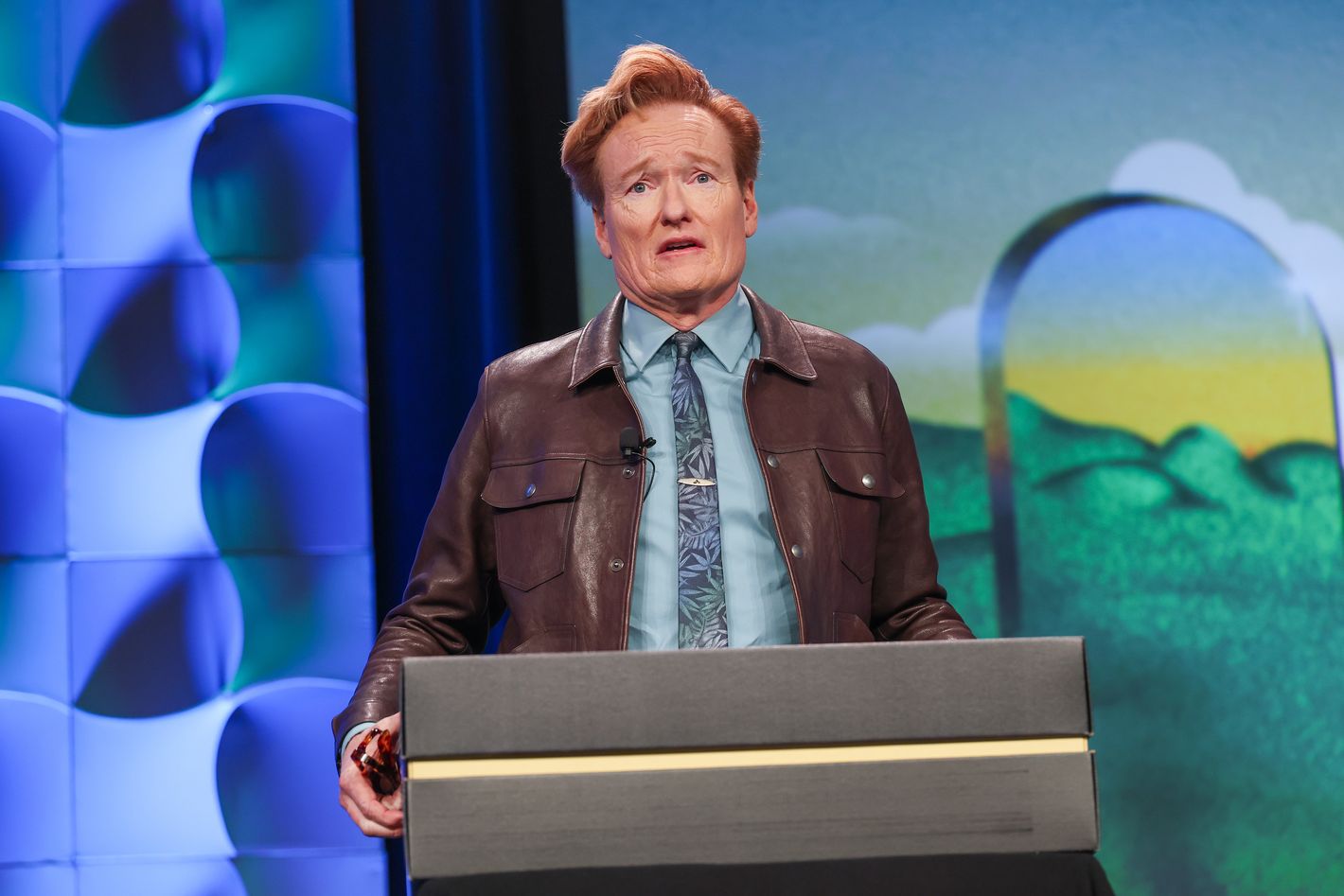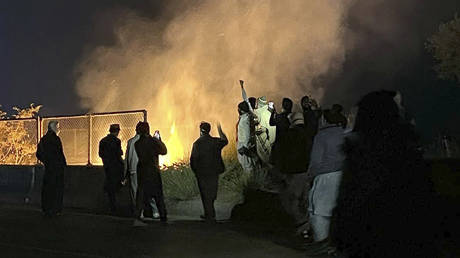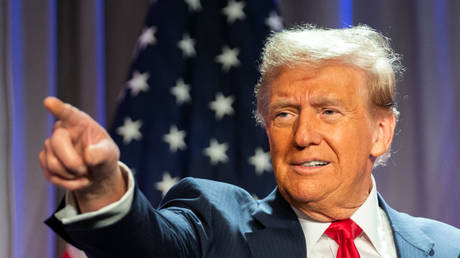
On the same Thursday evening that Vice-President J.D. Vance and Second Lady Usha Vance were aggressively booed during a National Symphony Orchestra performance at the Kennedy Center, another type of protest was taking place nearby.
Roughly 630 feet away from the center’s concert hall, on the Millennium Stage located at the opposite end of the long, red-carpeted Grand Foyer, folk musicians Nora Brown and Stephanie Coleman paused a half-hour into their set to display a pair of signs. One said, “Reinstate Queer Programming,” the other read, “Creativity at the Kennedy Center Must Not Be Suppressed,” and both were met with enthusiastic applause. Brown and Coleman closed their performance with “Sow ’Em on the Mountain” — “If you been lyin’ / You better quit your lyin’ / You’re gonna reap just what you sow” — and were joined onstage by audience members who sang along and held up a banner with the words, in large red-and-black text, “Art will not submit to your authority, Trump!”
“We play folk music and there’s a lot of protest music that is part of the folk-music canon, but we definitely would not identify as people who play political music,” Coleman says. “This is uncharted territory for us as musicians to be making such an overt political statement onstage.”
In the five weeks since President Donald Trump assumed control of the Kennedy Center by firing all the Biden-appointed members on its once-bipartisan board of directors, appointing Trump loyalists who voted for the president to take over as chairman, and replacing Kennedy Center president Barbara Rutter with Trump special envoy Richard Grenell, several artists and shows have canceled their scheduled performances there. Issa Rae, Pulitzer Prize–winning musician Rhiannon Giddens, the band Low Cut Connie, and a touring production of Hamilton all generated headlines for rejecting a venue that now officially falls under Trump’s eye. But many other artists have decided to appear on the Kennedy Center’s stages as planned, seizing the opportunity to express their disapproval of the changes Trump and his team are trying to implement. (Trump previously told reporters that his administration would make sure future programming at the Kennedy Center is “not going to be woke.”)
The most high-profile example of Trump resistance within the walls of the arts institution — which he deemed “in such bad shape” during a tour earlier this week — could come Sunday evening, when the Kennedy Center’s annual Mark Twain Prize for American Humor is presented to recurring Oscar host Conan O’Brien during a ceremony that, for the second consecutive year, will later be streamed on Netflix.
According to Kennedy Center spokespeople, the ceremony, which has only been canceled twice in its 27-year history, during the COVID pandemic in 2020 and 2021, is very much a go. Although attempts to seek comment from O’Brien via his rep went unanswered, he is expected to attend on Sunday, along with other comedians and colleagues paying tribute to him. Exactly who those comedians and colleagues are remains a mystery. The lineup for the event has traditionally been announced ahead of time, but the Kennedy Center is withholding that information this year. According to a representative for the center, this is part of an effort to make the Twain Prize more closely mirror the Kennedy Center Honors, the other splashy lifetime awards presented every December. “We’ve been wanting to make this switch for a while now to treat the cast like we do for Honors and keep them a surprise for the recipient,” the rep explained in an email.
O’Brien is not a particularly political comedian. He tends to value silliness over social satire. But he did not shy away from making jokes about the current president while hosting this year’s Academy Awards, where he explained Best Picture winner Anora’s popularity by saying, “I guess Americans are excited to see somebody finally stand up to a powerful Russian.” Previous Twain proceedings have included commentary on sitting administrations. In 2017, the first Twain ceremony following Trump’s election, Jimmy Kimmel jokingly chided prize recipient David Letterman for retiring and causing the entire world to go to “complete and utter shit.” “You went out for a pack of cigarettes and left us with an orange stepfather,” Kimmel said, an obvious reference to Trump. At the end of his acceptance speech, Letterman pointedly quoted Twain himself: “Patriotism is supporting your country all the time, and your government when it deserves it.”
Still, plenty of artists see the value in A-listers simply opting out of the Mark Twain ceremony as a form of political protest, rather than participating in gentle chiding that may or may not rile Netflix audiences at home. For less famous performers, it’s more complicated. “I do think that in some cases canceling really is the best thing that a group can do, especially with larger artists with larger audiences,” Brown says. “These are the groups where it makes the news and it really sucks income from the Kennedy Center and I see a lot of value in that. But as artists with a smaller audience we have the loudest voice when we’re onstage.”
Comedian Zach Zimmerman debated pulling out of his scheduled February 21 stand-up shows at the center’s Club at Studio K. “The idea of being able to cancel and feeling morally superior — I could have done it,” he says. “But there’s a quote from Bayard Rustin, the gay Black architect of the March on Washington, that we need in every community a group of angelic troublemakers. So I was like, what would it be like to be a little more sneaky about this?”
Zimmerman revised his set and added some jokes about the changes at the arts institution on the Potomac River. “It is so great to be here at the Kennedy Center while it is still called the Kennedy Center. In mere days, weeks, maybe even hours, let’s be real: This will be the Donald Trump Center for the Performing Arts,” he said. “Do you know what? I welcome the change. This only became the Kennedy Center after Kennedy was … ” He let his voice trail off. “So the Donald Trump Center, it’s got a certain ring to it. Let’s build the Elon Musk Center. Let’s do it!”
Zimmerman also invited a faction of the Gay Men’s Chorus of Washington, whose performance of “A Peacock Among Pigeons” with the National Symphony Orchestra was canceled by Kennedy Center leaders, citing “financial reasons,” to appear onstage at the end of his set and sing. They delivered a spirited version of the Weather Girls’ “It’s Raining Men.”
Classical vocalist Karen Slack decided to move forward with her March 9 recital African Queens, a celebration of powerful female African leaders throughout history, because she thought it was important to tell those stories in light of the increasing erasure of Black history in schools and at places like Arlington National Cemetery. Washington Performing Arts, the group who booked the performance, offered her the opportunity to change venues but she said no.
“It’s tricky in the industry where classical music depends on some of those very same people who voted for Donald Trump, right?” she says. “Those promised tax cuts and everything will benefit many of the people who give the most for our industry. I’m very well aware of that.”
“But I’m not singing for those people,” Slack adds. “I’m singing for whoever wants to come and experience this beautiful art.”
When singer-songwriter Victoria Canal performed on February 15 on the Millennium Stage, a hub for free performances that are open to the public, she said in a TikTok video that she could sense the anxiety in the building and among veteran Kennedy Center staff now having to report to Trump’s people. “That’s part of the reason I felt compelled to wear a protest shirt,” she says. (She wore a tee that read “Anti-Trump AF.”) “I felt like the only person in the building in a position to do so.”
Kennedy Center staffers who spoke to Vulture on the condition of their anonymity confirm what Canal sensed: that employees from the pre-Trump era are nervous and frazzled by the changes. “I think a lot of people are just worried,” one insider tells me. “Of course, there are personal worries about job stability, but there’s also a lot of worry about the stability of the center itself. This has created such a major business disruption that will, of course, have severe financial implications.”
Multiple Kennedy Center contacts claim that ticket sales have fallen by 50 percent since Trump’s mid-February takeover, a figure also reported by the Washington Post, and never rebounded. When asked to confirm this information, Roma Daravi, the new vice-president of public relations at the Kennedy Center, wrote via email: “The Center has a long-standing history of not commenting or sharing information on ticket sales and that posture will not be shifting under new leadership. That info comes from an unnamed source and the Center certainly did not provide WaPo with that information.”
“At first it felt like we were trying to get our footing after an earthquake,” says another staff member. Now that more Trump team members have been installed throughout the institution, they say, “we’re starting to see what the landscape is and it’s a combination of a lack of actual care about the mission of the organization and the need to to be right” amid intensifying culture wars.
Some employees are determined to stay as long as possible, but others are taking new jobs or, in some cases, resigning without one. “But we are ready for these artists to come and do their art,” this staff member reiterates. “Even more so if it’s an artist who wants to speak truth to power. They are welcome. We’re still an artist-centric staff, and it doesn’t matter what the organization leadership is trying to do or say.”
Every performer interviewed for this piece is aware that the situation at the Kennedy Center is in flux and that they may have to reevaluate their willingness to perform there in the future. “If suddenly all the artists are like, We’re canceling or a precedent is established, I’m not opposed to changing my mind,” Zimmerman says. Other comedians are bracing for blowback in the other direction. Chris Grace, the Superstore star, is scheduled to bring his show “Chris Grace: As Scarlett Johansson,” an exploration of Johansson’s decision to star in the 2017 anime-inspired film Ghost in the Shell, in July. “I’m still assuming it could be canceled,” Grace says. “I also feel like if they cancel it, I’m going to market the shit out of it.”





